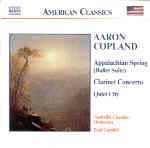This disc substantially duplicates the repertoire on an all-Copland program produced by DG with the Orpheus Chamber Orchestra. However, where DG included the Short Symphony, Naxos offers the Clarinet Concerto. While the Nashville Chamber Orchestra doesn’t offer quite the tonal refinement and polish of Orpheus, it basically plays just as well, and its slightly weightier, gutsier, more rustic sonority arguably suits the music even better. In the famous rehearsal disc that accompanied Copland’s own recording of the original chamber version of Appalachian Spring, he can be heard exhorting his players not to sentimentalize the music: “…it’s a little too much on the Massenet-side,” he tells them. Obviously Paul Gambill understands this point, for he offers interpretations ideally poised between warmth and simplicity, full of those clean and clear sonorities that Copland made his own.
It should come as no surprise that, as a major musical capital, Nashville offers a large pool of excellent professional performers from which to draw, and as with its full-sized symphony, the Nashville Chamber Orchestra obviously employs some major talent, particularly among its strings. Copland’s music is full of complex rhythms, often combining them with stratospheric violin writing. At such moments as the “Danza de Jalisco” from Three Latin American Sketches, or the initial allegro of Appalachian Spring, the Nashville players offer impressive accuracy of both rhythm and pitch. Quiet City benefits from some smooth-as-silk trumpeting from Scott Moore, while Laura Arden (principal clarinet with the Atlanta Symphony) turns in a masterful performance of the Clarinet Concerto. She commands a lovely, liquid tone in the lyrical opening movement (her pianissimo playing at the end is exquisite) and captures the finale’s jazz elements without ever turning raucous.
The version of Appalachian Spring offered here is billed as the “Original Ballet Suite”. It is not. The “original” ballet suite is the full orchestral version most familiar to music lovers, dating from just after the premiere in the mid-1940s. More than a decade later, in 1958, Copland published a new orchestration of the suite in which he returned to the chamber instrumentation used in the full-length ballet, allowing the option of a few extra strings (which I assume are used here), and this is what Naxos gives us. Gambill conducts this piece as well as anyone ever has; he’s particularly adept at sustaining the flow of the slower sections without letting the music sag, and he gets an astonishingly full sound from his ensemble (listen to the focused tone of the basses when they first enter in the “Simple Gifts” variations). Sonics of ideal transparency and presence set the seal on a disc that’s practically perfect from just about any perspective. [12/14/2002]
































